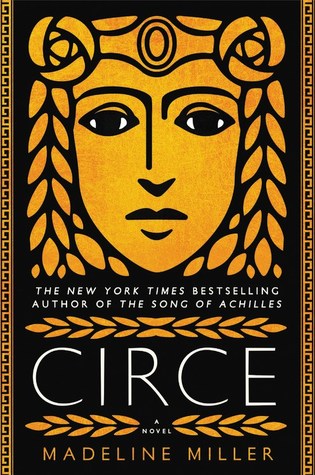 After an off-month for Book of the Month in March, where they only had one title in which I was interested, they came back strong in April with a variety of books with piqued my interest. The first and foremost of them, however, was Circe. I haven't read Miller's other Greek mythology-inspired book, The Song of Achilles, but Circe's story interest me anyway, and much more than Achilles' did. A goddess in her own right and the daughter of Titans, Circe is best known for her appearance in The Odyssey, where she tries to delay Odysseus on his way home from the Trojan War. She is not Calypso, another nymph/witch who succeeds in delaying Odysseus for something like seven years.
After an off-month for Book of the Month in March, where they only had one title in which I was interested, they came back strong in April with a variety of books with piqued my interest. The first and foremost of them, however, was Circe. I haven't read Miller's other Greek mythology-inspired book, The Song of Achilles, but Circe's story interest me anyway, and much more than Achilles' did. A goddess in her own right and the daughter of Titans, Circe is best known for her appearance in The Odyssey, where she tries to delay Odysseus on his way home from the Trojan War. She is not Calypso, another nymph/witch who succeeds in delaying Odysseus for something like seven years.One problem with writing a book based on mythology is that there are so many versions of different mythos that, no matter how you write it, you're bound to piss someone off because you left out their favorite part or adapted it in a way they don't like. The only thing to do is to pick a string, stick to it, and don't waste time trying to justify every detail you changed or neglected because it doesn't fit with the thread of story that you chose to follow. Miller does this admirably. She leaves out pieces of Circe's mythology that aren't well known or that conflict with her strong center story line--that of a woman who defies the gods and seeks love even in her isolation--and builds connections to other, more tangential parts that work with that story. For example, Circe only has one child with Odysseus in this telling, when she's sometimes said to have three; in contrast, Miller builds up Circe's connections with her siblings, particularly Pashiphae, mother of the Minotaur, in order to insert Circe into that story and emphasize her breaking with her Titan kin to seek her own fulfillment instead. She overcomes so much--her vicious family, an Olympian pantheon who'd be happier with her dead, her own mistakes, rape--and while she doesn't always do it with grace, she does it with her own sort of strength.
That said, despite so many fascinating mythological elements tying in, this is not a fast-paced book. Circe's story is, ultimately, one of exile to an island with nothing but her magic and her animals to keep her company. While at first I found even these portions of the book fascinating--watching Circe grow into her arts, tame her animals, etc. was appealing in its own way--it became tedious after a while. Of course, it also grows tedious for Circe herself, so maybe that was suiting, but I did find myself skimming more on these quiet portions as the book went on. Even some of the parts of the book that should have been riveting--such as the entire story surrounding Scylla--were sometimes more slow than not, because of how much pondering Circe does as opposed to actually acting. Ultimately, however, the book has an extremely satisfying ending--just firm enough and yet vague enough to leave possibilities and closure at the same time.
I really, really enjoyed this book. I had completely discounted The Song of Achilles when I saw it before because I didn't think it would be something that interested me, but this book has completely changed my mind. This is an extremely underutilized vein of fantasy--all of the Greek myth retellings or adaptations that are popular tend to be modern rather than set in their historic period, which is honestly their strength--and I would love to see more like this take the stage in popular fantasy.
4 stars out of 5.
No comments:
Post a Comment